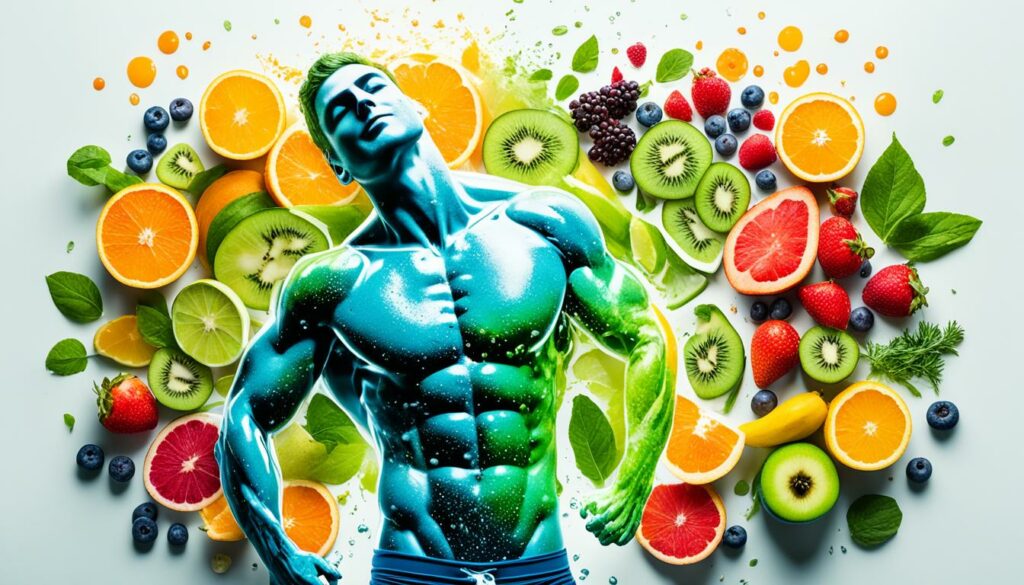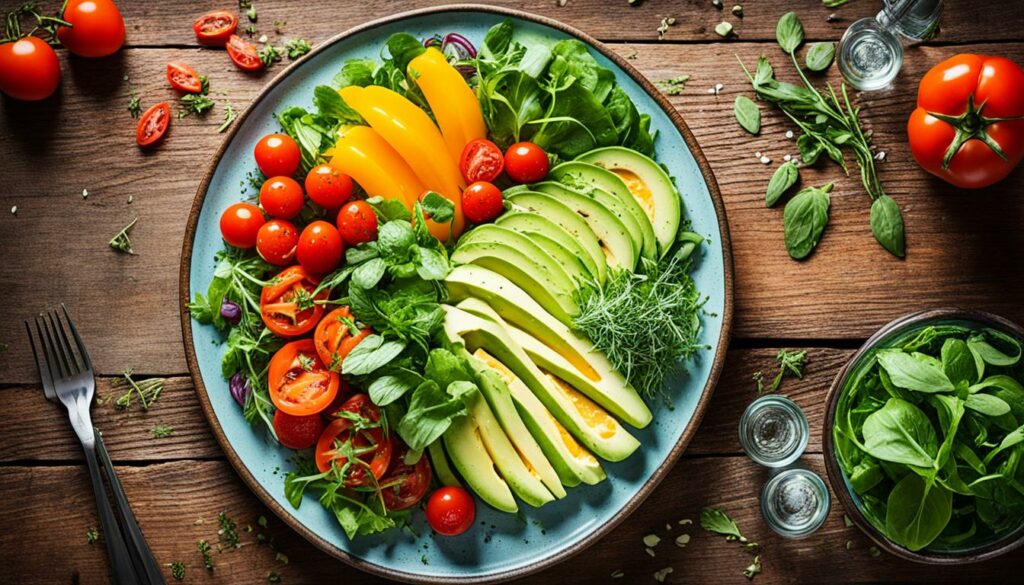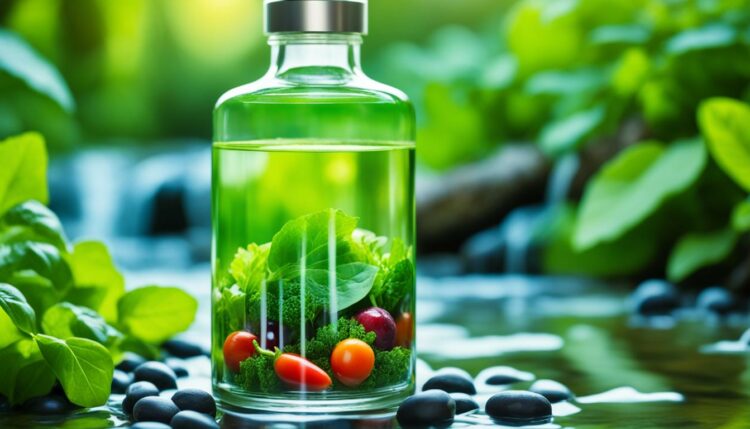Did you know that the global detox market is expected to reach a staggering $78.4 billion by 2025?
Detox diets have become increasingly popular as people seek ways to eliminate toxins from their bodies and improve their overall health. However, it’s important to separate fact from fiction when it comes to detoxing. While some detox diets claim to work wonders, there is limited scientific evidence supporting their efficacy.
In this article, we will explore the essentials of a detox diet, debunk common misconceptions, and provide tips to support your body’s natural detoxification processes. Whether you’re looking for a natural detox diet plan, powerful detox recipes, or easy detox tips, we’ve got you covered!
Key Takeaways:
- Detox diets have gained popularity, but there is limited scientific evidence supporting their efficacy.
- The body has natural mechanisms to eliminate toxins without the need for special diets or supplements.
- Common misconceptions about detox diets include the use of laxatives, diuretics, and specific foods with detoxing properties.
- Supporting the body’s natural detoxification processes can be achieved through healthy habits and lifestyle choices.
- Consult with a healthcare professional before starting any detox or dietary changes.
What is a Full Body Detox?
A full body detox, also known as detoxification, is the process of eliminating toxins from the body. It often involves following a specific diet or using products that claim to cleanse and improve health.
However, the body is already equipped with natural detoxification mechanisms and does not require special diets or supplements to eliminate toxins.
Detox diets and supplements often do not specify the specific toxins they aim to remove or the mechanism by which they eliminate them. The body’s organs, such as the liver, kidneys, digestive system, skin, and lungs, play a vital role in the natural detoxification process.
The liver, for example, filters toxins and metabolic waste from the bloodstream, converting them into less harmful substances that can be eliminated from the body.
The kidneys help remove waste and excess fluid through urine, while the digestive system processes and eliminates toxins through the colon. The skin, the body’s largest organ, eliminates toxins through sweat, and the lungs expel harmful substances through respiration.
These natural detoxification processes work together to maintain the body’s overall health and balance. However, factors such as a poor diet, exposure to environmental toxins, and unhealthy lifestyle habits can overwhelm the body’s detoxification systems, leading to toxin buildup and potential health issues.
While a full body detox may offer short-term benefits, it is essential to focus on long-term healthy habits to support the body’s natural detoxification processes.
This includes eating a balanced diet rich in fruits, vegetables, and whole grains, staying hydrated, engaging in regular physical activity, managing stress levels, and avoiding excessive alcohol consumption.
A holistic approach to health and wellness, rather than relying solely on detox diets or supplements, can ensure the maintenance of optimal organ function and the elimination of harmful substances from the body.

Common Misconceptions about Detox Diets
Detox diets, often associated with the use of laxatives, diuretics, vitamins, minerals, teas, and specific foods believed to have detoxing properties, have gained popularity in recent years. However, it is important to address some common misconceptions surrounding these diets.
“Detox diets rarely specify the specific toxins they aim to remove or the mechanism by which they eliminate them.”
While detox diets claim to eliminate toxins from the body, there is limited scientific evidence supporting their effectiveness in toxin elimination or sustainable weight loss. These diets often fail to specify the specific toxins they target and the mechanism by which they eliminate them.
The body already possesses sophisticated mechanisms to detoxify itself through the liver, kidneys, digestive system, skin, and lungs. These organs work together to eliminate toxins and maintain the body’s overall health and balance.
“Detox diets do not do anything that the body cannot naturally do on its own.”
Detox diets do not provide any benefits that the body cannot naturally achieve. The notion that detox diets are necessary to eliminate toxins is misleading. The body’s natural detoxification processes are designed to effectively remove harmful substances without special diets or supplements.
It is crucial to focus on adopting a balanced and sustainable lifestyle that supports the body’s natural detoxification processes, rather than relying on potentially unnecessary and restrictive detox diets.
Table 1: Common Misconceptions about Detox Diets
| Misconception | Reality |
|---|---|
| Detox diets eliminate specific toxins | Detox diets rarely specify the toxins they target |
| Detox diets are necessary for toxin elimination | The body naturally eliminates toxins through its organs |
| Detox diets offer unique benefits | The body’s natural detoxification processes are sufficient |
Ways to Support the Body’s Natural Detoxification Processes
While the body’s natural detoxification processes are effective, there are several ways to support and optimize them. By incorporating healthy habits into your lifestyle, you can enhance your body’s ability to eliminate toxins and promote overall well-being. Here are some key strategies to consider:
- Limit Alcohol Consumption: Excessive alcohol intake can put strain on the liver, the primary detoxifying organ. By reducing alcohol consumption, you can support liver function and enhance its ability to eliminate toxins.
- Focus on Quality Sleep: During sleep, the brain flushes out toxins that have accumulated throughout the day. Aim for 7-9 hours of quality sleep per night to support this vital detoxification process.
- Drink More Water: Adequate hydration is crucial for flushing out waste products and facilitating detoxification. Make it a habit to drink plenty of water throughout the day to support the body’s natural cleansing processes.
- Reduce Sugar and Processed Foods: High sugar and processed food consumption can impair the liver’s detoxification function and contribute to the accumulation of toxins in the body. Opt for whole, unprocessed foods to support optimal detoxification.
- Eat Antioxidant-Rich Foods: Antioxidants help protect the body against oxidative stress caused by free radicals and support overall detoxification. Include foods like berries, leafy greens, and colorful vegetables in your diet to boost your antioxidant intake.
- Eat Foods High in Prebiotics: Prebiotics are a type of fiber that nourishes the beneficial bacteria in your gut. A healthy gut microbiome is essential for proper detoxification. Incorporate foods such as garlic, onions, and bananas into your diet to support gut health.
- Decrease Salt Intake: Consuming excessive amounts of salt can lead to fluid retention and strain the kidneys. Limit your salt intake to prevent water retention and support healthy kidney function.
By implementing these strategies, you can support your body’s natural detoxification processes and promote optimal health and well-being.
| Ways to Support the Body’s Natural Detoxification Processes | Benefits |
|---|---|
| Limit Alcohol Consumption | Supports liver function and enhances toxin elimination |
| Focus on Quality Sleep | Facilitates brain detoxification and overall toxin removal |
| Drink More Water | Aids in waste product removal and supports natural cleansing |
| Reduce Sugar and Processed Foods | Protects liver function and prevents toxin accumulation |
| Eat Antioxidant-Rich Foods | Counters oxidative stress and supports overall detoxification |
| Eat Foods High in Prebiotics | Nourishes gut bacteria and promotes proper detoxification |
| Decrease Salt Intake | Prevents fluid retention and supports healthy kidney function |
Implementing these lifestyle changes will not only aid in natural detoxification but also contribute to your overall well-being. Remember to consult with a healthcare professional before making any significant dietary or lifestyle changes.
Detox Diet Plan and Recipes
Following a detox diet plan can help support the body’s natural detoxification processes. One popular option is the vegan detox diet, which eliminates sugars, alcohol, processed foods, grains, gluten, and animal products. Instead, this diet focuses on consuming green juices, smoothies, and plant-based meals.
It is important to incorporate nutrient-dense foods and stay hydrated during the detox. Here are some detox diet recipe options:
- Porridge oats for breakfast: Start your day with a warm and nourishing bowl of porridge oats. Add toppings such as fruits, nuts, and seeds for added flavor and nutrition.
- Rainbow salad for lunch: Prepare a colorful salad with a variety of vegetables like spinach, kale, bell peppers, carrots, and tomatoes. Top it off with a citrusy dressing for a refreshing twist.
- Quinoa and sweet potato salad for dinner: Combine cooked quinoa, roasted sweet potatoes, leafy greens, and a tangy vinaigrette dressing to create a satisfying and wholesome meal.
- Fresh fruit, trail mix, or kale chips for snacks: Keep your energy levels up with nutritious snacks like fresh fruits, a mix of nuts and dried fruits, or homemade kale chips.
These recipes provide a balance of flavors, textures, and nutrients to support your body’s detoxification process. Remember to enjoy them mindfully and savor each bite.
Benefits of a Vegan Detox Diet
A vegan detox diet helps eliminate potential allergens, reduces inflammation, and provides a wide range of vitamins, minerals, and antioxidants that support the body’s natural detoxification processes.
By focusing on whole plant-based foods, you can nourish your body with essential nutrients while promoting overall health and vitality.

| Recipe | Protein | Carbohydrates | Fat | Fiber | Calories |
|---|---|---|---|---|---|
| Porridge oats for breakfast | 9g | 54g | 6g | 8g | 289 |
| Rainbow salad for lunch | 8g | 32g | 12g | 9g | 273 |
| Quinoa and sweet potato salad for dinner | 10g | 46g | 8g | 7g | 322 |
| Fresh fruit, trail mix, or kale chips for snacks | 4g | 15g | 8g | 4g | 137 |
Tips for a Successful Detox
To have a successful detox, it is essential to follow some key tips that can help optimize your body’s natural detoxification processes. By incorporating these practices into your daily routine, you can support your body in cleansing and rejuvenating. Here are some detox tips to consider:
- Start your day with hot water and lemon: Kickstart your detox journey by drinking a mug of hot water with a squeeze of lemon. This simple ritual helps alkalize the body and stimulates digestion, preparing it for the day ahead.
- Fuel up on whole foods: Focus on consuming whole, unprocessed foods during your detox. These include fresh fruits, vegetables, whole grains, nuts, and seeds. These nutrient-dense foods provide essential vitamins, minerals, and antioxidants that support your body’s natural detoxification processes.
- Load up on fruits and vegetables: Aim to consume at least five portions of fruits and vegetables each day. These natural powerhouses are packed with fiber, antioxidants, and phytochemicals that aid in the elimination of toxins and support overall health.
- Lay off processed foods and animal products: During your detox, limit your consumption of processed foods and animal products. These items often contain additives, preservatives, and unhealthy fats that can hinder your body’s detoxification efforts. Instead, choose plant-based alternatives and whole food options.
- Avoid black tea, coffee, and alcohol: To allow your body to detox effectively, it’s best to avoid black tea, coffee, and alcohol during your cleanse. These beverages can place an additional burden on your liver and kidneys, hindering their detoxifying functions.
- Get moving with exercise: Incorporating gentle exercise, such as walking, yoga, or swimming, into your daily routine can aid digestion and circulation. Regular physical activity helps keep your lymphatic system flowing and supports the elimination of toxins through sweat.
Following these detox tips can enhance your detox success and promote overall well-being. By adopting these healthy habits and supporting your body’s natural detoxification processes, you can experience the benefits of a revitalized and rejuvenated body.
Conclusion
In conclusion, maintaining healthy habits and supporting the body’s natural detoxification processes can yield a range of benefits. While the body already has its own mechanisms for detoxification, incorporating a detox diet plan and making smart dietary choices can enhance these functions.
By consuming nutrient-dense foods, staying hydrated, and practicing healthy habits, individuals can optimize their body’s natural detox processes and promote overall well-being.
It is important to approach detox diets with caution and rely on scientific evidence to ensure their effectiveness. Consulting with a healthcare professional before embarking on any detox or dietary changes is crucial for personalized guidance and safety.
Healthy habits such as eating antioxidant-rich foods, staying hydrated, and limiting processed foods can support the body’s detoxing functions and aid in maintaining vitality.
Remember, a holistic approach to detoxification involves not only dietary choices but also embracing a balanced lifestyle. By adopting healthy habits and supporting the body’s natural detoxification processes, individuals can nurture their overall health and well-being.
FAQ
What is a full body detox?
A full body detox, also known as detoxification, is the process of eliminating toxins from the body.
Do I need a detox diet or supplements to eliminate toxins?
No, the body is equipped with natural detoxification mechanisms and does not require special diets or supplements for toxin elimination.
What are common misconceptions about detox diets?
Detox diets are often associated with the use of laxatives, diuretics, vitamins, minerals, teas, and specific foods thought to have detoxing properties. However, there is limited evidence supporting their effectiveness.
How can I support the body’s natural detoxification processes?
You can support your body’s natural detoxification processes by limiting alcohol consumption, getting enough quality sleep, staying hydrated, reducing sugar and processed foods, eating antioxidant-rich foods, consuming foods high in prebiotics, and decreasing salt intake.
What is a detox diet plan and what are some recipe options?
A detox diet plan involves eliminating sugars, alcohol, processed foods, grains, gluten, and animal products. Recipe options include porridge oats for breakfast, rainbow salad for lunch, quinoa and sweet potato salad for dinner, and fresh fruit or kale chips for snacks.
What are some tips for a successful detox?
Some tips for a successful detox include starting each day with hot water and lemon, focusing on whole foods and consuming fruits and vegetables, limiting processed foods and animal products, avoiding black tea, coffee, and alcohol, and incorporating gentle exercise.
What are the benefits of a detox diet?
While the body has natural detoxification mechanisms, supporting and optimizing these functions through healthy habits can promote overall health and vitality.




